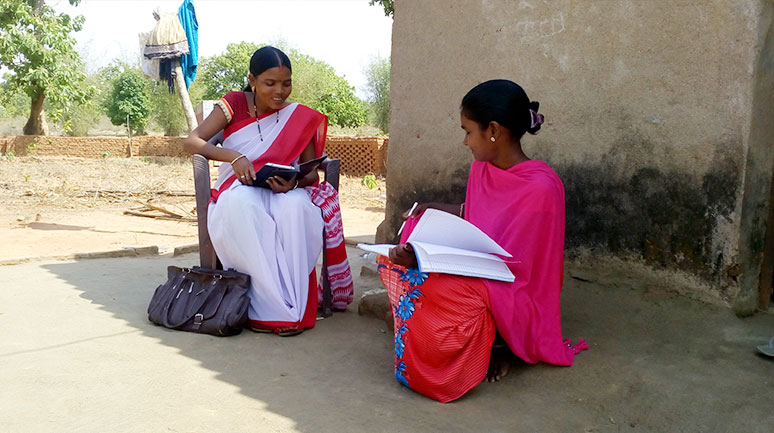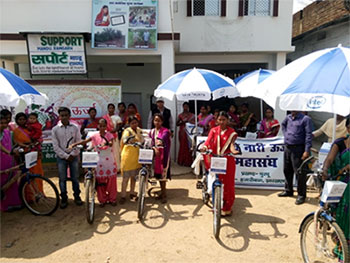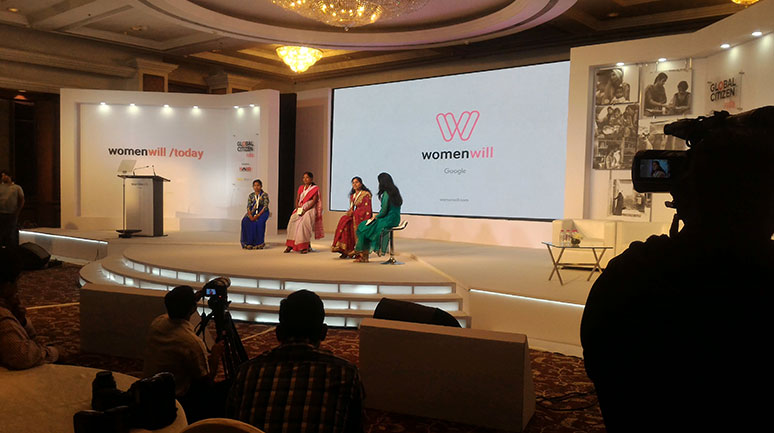Chameli’s Blue Cycle


Igniting hope and nurturing potential in women is better achieved by example rather than any theory or sermon. Chameli proves to all her fellow SHG women that, with self-belief and a drive to succeed, all of them together will be a force to reckon with, a powerful voice for women’s upliftment and standing in the village
T he story began a few years ago. It was the last day of the exams for the students of Class IX. A gush of students came out of the examination centre. Chameli was one among the several youngsters checking the question paper and estimating her marks. She was elated. All her exams had gone well and she expected a good result. She had always dreamt of becoming a teacher, and the thought of teaching students exhilarated her. She suddenly remembered that her mother had asked her to come home as soon as the exam got over. She rushed home only to find the family of her late elder sister in the house. Chameli’s parents were sitting on the floor and pensively listening to her brother-in-law.
Chameli’s sister had died three months back, leaving behind a two- year-old son. Her brother-in-law now wanted to marry Chameli so she could take care of the child. She was shocked. Why her? She hadn’t even finished her schooling. She protested to her parents but her voice remained unheard. Her father brusquely told her, “Iss larke ka kya kasoor hai? Tumhari behen ki jagah sirf tum hi le sakti ho, yeh bohot achcha prastav hai. Wo acchha aadmi hai, tum padhai aage kar lena. (What is the fault of this boy? Only you can take place of your sister; this is a very good proposal. He is a very good man and you can continue your studies later).” Within the next few months, Chameli was married to her deceased sister’s husband. Four years passed since Chameli had got married. She gave birth to a girl, who had physical disabilities. Her life revolved around looking after her home and the two children.
Four years passed since Chameli had got married. She gave birth to a girl, who had physical disabilities. Her life revolved around looking after her home and the two children
O nce married, Chameli’s life changed drastically. She was tied down with household responsibilities. Her only solace was her sister’s son. Although a responsibility, she liked playing with him. Her husband ignored her as well as the child. He left them for an outstation job in order to earn a better and secure income; however, that never made a difference to the finances available to the household because he only sent home a paltry sum of money.
Four years passed since Chameli had got married. She gave birth to a girl, who had physical disabilities. Her life revolved around looking after her home and the two children. Being homebound, she felt throttled and helpless. During this time, when she was in distress, she happened to meet the Local Resource Person (LRP)— Vikrant Kumar—from an organization called Society for the Upliftment of People with People’s Organization and Rural Technology (SUPPORT).
The organization was promoting a Self Help Group (SHG) and Chameli readily joined it. Seeing her interest, the LRP motivated her to join other skill building and training programmes organized by SUPPORT, especially for women farmers. Although hesitant in the beginning, Chameli took the first step. Her fellow SHG members assured her of their support.
Chameli was exposed to the women’s SHG programme, a micro-finance and entrepreneurship development initiative in Jharkhand, to help rural women invest in small savings and skill building for micro-level agriculture and horticulture-based business enterprises. Under the programme activity of the SHG, she underwent vocational training on ‘Kitchen Gardening’, a value chain of potato, tomato and chilli, and on linkages with the Farmers’ Produce Organization (FPO). She also underwent vocational training on small-scale business development.
Chameli promoted SHGs in her own village and imparted skill building training to SHG members. She later started going beyond her village boundaries, to support other women’s SHG programmes. In the beginning, it was a struggle for her. Chameli had to overcome her fears and negotiate with her family members. “Pahle pahle jub main aas-pas ke gaon me jaane lagi, mere mann mein bhay aur utsukta dono hi tha. Main sochne lagi thi ki main kaise kar paunga yeh kam. Kabhi kabhi ghar aate aate shyam ho jata tha aur gharwale kaam chhorne ke liye bol dete the. (In the beginning, when I started going to the nearby villages, I had a lot of apprehensions as well as enthusiasm. I used to wonder how I would manage to do the job. Sometimes, it got very late in the evening and my family members would ask me to leave the job).”
It was a difficult phase for Chameli. She juggled between her responsibilities at home and the demands of her work. “Main teacher to nahi ban payi par jo kaam kar rahi hoon wo bhi kuchh aisa hi hai. Ab mein bacchhon ko nahi mahilaon ko sikha rahi hoon. Mujhe apne liye yeh to karna hi tha. (I couldn’t become a teacher but what I am doing is similar to teaching. Now, instead of children, I train women. I have to do this work for myself),” Chameli asserted. She decided to pursue her dreams and eventually succeeded in convincing her family to let her work. Chameli was selected as one of the Internet Saathis in the programme. She attended the Training of Trainers and became a Master Trainer in the Internet Saathi programme. Being an Internet Saathi, she was given a blue cycle and a blue kit meant for trainers.
Chameli was selected as one of the Internet Saathis in the programme. She attended the Training of Trainers and became a Master Trainer in the Internet Saathi programme. Being an Internet Saathi, she was given a blue cycle and a blue kit meant for trainers
B eing engaged with the women’s SHG programme gave Chameli a purpose. She wanted to be a part of a profession like that. She started visiting the families of group members, to understand their issues. She accompanied the staff from SUPPORT, slowly learning communication and facilitation skills. “Humare yahan gaon ki zyadatar auratein padhi likhi nahi hoti hain. Unko sab koi chizon ke liye ghar se permission lena parta hai; aise me unko lagta tha yeh dal banana, baithak karna, sanstha jana, bank jake kam karna unke samajh ke bahar hai. (In our villages, most of the women are uneducated. For everything that they wished to do, they need the permission of the family; they, therefore, think that this work of group formation, attending meetings, going to the agencies, or going to the bank, is not for them).”
She motivated the women to join an SHG. With her efforts, 36 SHGs were formed. The women’s perception of themselves changed as they gathered for weekly meetings, to discuss various issues, including going to the bank to receive bank loans, etc. Chameli became an active participant in various forums, attending SHG Federation meetings, gram sabha meetings, panchayat meetings, among others. She became the leader (Netri) of the Churchu Nari Urja Maha Sangha—an SHG Federation. Things were going well for Chameli. Her struggles were reaping fruit now.
 I
n 2016, Tata Trust and Google India initiated a special programme jointly called the ‘Internet Saathi’ in Jharkhand. The programme aimed at addressing the gender disparity in Internet use in rural India. The lack of Internet literacy puts women in rural India at a further risk of getting marginalized in society. The programme trained women to use the Internet and benefit from it in their daily lives. Chameli came to know about the programme from the SUPPORT staff. She was attracted by the prospects of the programme. She was very keen to learn about the Internet but never thought that one day she herself would become an Internet Saathi. Chameli was selected as one of the Internet Saathis in the programme. She attended the Training of Trainers and became a Master Trainer in the Internet Saathi programme. Being an Internet Saathi, she was given a blue cycle and a blue kit meant for trainers.
I
n 2016, Tata Trust and Google India initiated a special programme jointly called the ‘Internet Saathi’ in Jharkhand. The programme aimed at addressing the gender disparity in Internet use in rural India. The lack of Internet literacy puts women in rural India at a further risk of getting marginalized in society. The programme trained women to use the Internet and benefit from it in their daily lives. Chameli came to know about the programme from the SUPPORT staff. She was attracted by the prospects of the programme. She was very keen to learn about the Internet but never thought that one day she herself would become an Internet Saathi. Chameli was selected as one of the Internet Saathis in the programme. She attended the Training of Trainers and became a Master Trainer in the Internet Saathi programme. Being an Internet Saathi, she was given a blue cycle and a blue kit meant for trainers.
“Main humesha se hi kuchh banna chahti thi. Internet Saathi ne mujhe woh mauka diya. (I always wanted to become something in my life; Internet Saathi has given me that opportunity),” Chameli says. As an Internet Saathi, Chameli travels to villages and teaches SHG women about the Internet and its uses in daily life. She teaches women how to use the Internet through their smart phones or tablets for the purposes of banking, transferring money, learning about agriculture—diseases, pest attacks and the solutions and also about the various government schemes and benefits available to them.
“Internet bahut kaam ka hai. Ab hum sab kuchh us se pata laga sakte hain. Kabhi kabhi internet se alag alag khana banane ka video dekhte hai, gaana sunte hai. Bahut achha lagta hai. (The Internet is very useful, we get to know everything. Sometimes we also look at cooking videos and different recipes and listen to songs. We like it very much),” Chameli says impishly. Chameli is a known face now. “Aas paas ke gaon ki ladkiyan mera naam nahi bhi janti hon, par neeli cycle sab pahchante hain. (Girls from nearby villages may not know my name but everyone recognizes my blue cycle).”
Chameli is a known face now. “Aas paas ke gaon ki ladkiyan mera naam nahi bhi janti hon, par neeli cycle sab pahchante hain. (Girls from nearby villages may not know my name but everyone recognizes my blue cycle).”
C hameli is a known face now. “Aas paas ke gaon ki ladkiyan mera naam nahi bhi janti hon, par neeli cycle sab pahchante hain. (Girls from nearby villages may not know my name but everyone recognizes my blue cycle).”
She not only works with SHG members but also trains aanganwadi workers and adolescent girls on issues such as menstrual hygiene, early marriage and pregnancy, education, child marriage prevention and girls’ education.
Chameli’s earning of Rs 6,000 has created a big shift in the way her family now accepts her. She is respected and has a say in family matters. From a docile homemaker, Chameli is now an important decision-maker in the family. Her views in household matters are taken seriously. Her income and savings have helped her meet the family’s health expenses, her son’s school fees and other household expenses. Chameli’s husband, who was unsupportive of her work in the beginning, is now living with them and has started helping her in the household chores.
Even with her busy schedule, she takes out time to help her son in his studies. Her son is now in Class IX. With a little smile on her face she says, “Main hamesha chahti tha ki mera beta bara hoke teacher bane, lekin Hindi cinema dekh dekh ke wo police wala banna chahta hai. (I always wanted my son to become a teacher, but after watching Hindi movies, he wants to become a policeman).”

Chameli (in a white saree) as a panelist in the Womenwill/Today event in Mumbai.
Thousands of women in the villages of Jharkhand are living in just one chapter (a life that was bound by social, economic, psychological factors). Would the next chapter of their lives ever open?
Thousands of women in the villages of Jharkhand are living in just one chapter (a life that was bound by social, economic, psychological factors). Would the next chapter of their lives ever open?
I n 2017, Chameli became the first worker of the ‘Internet Saathi’, who represented the women of Jharkhand state in an All India-based Event “Womenwill/ Today—Story of the Internet Saathi.” (https://www.youtube. com/watch?v=TABwCLpptGs).
The Global Citizen programme sponsored by Google-India was held in Mumbai to felicitate the best practitioners under the Womenwill programme. Chameli participated in the panel discussion on the session held on Internet Saathi and received the award for becoming one among the 10 best performing professionals of India.
“Shuruwaat ke dino mein, bare sarkari office ke logon se baat karne me ghabrahat hota tha…bank mein jake thik se form bhar payenge ki nehi, kasie baat karenge, kaise samjhayenge yeh sab dar lagta tha? Lekin dhire dhire sab thik laga. Fir jab mujhe hawai jahaz mein Mumbai bheja gaya, programme ke liye, mujhe dar laga. Lekin baki mahilayen mere liye khush thi. Maine bhi socha ke mujhe yeh karna hi parega, abhi toh kisi se bhi acche se samjha ke baat karne mein bhay nehi hota. (Initially, I felt very hesitant talking to government officials…how would I make them understand, how would I fill the forms in a bank? Gradually, I gained confidence. However, I felt fear again when I took the flight to Mumbai. All the other women were happy for me. I also knew I have to do it. Now, I have no fear in explaining things to anyone.),” Chameli shared in the SHG Federation meeting. She encouraged them by saying that if she could, they could all do the same. The only thing they have to do is to support each other.
Thousands of women in the villages of Jharkhand are living in just one chapter (a life that was bound by social, economic, psychological factors). Would the next chapter of their lives ever open? Chameli was lucky to get the opportunities and prudent and courageous enough to grab those opportunities. To begin a new chapter in their lives, the women need to be supported. Not only the support that Chameli mentioned, that is, women supporting each other, but also through all of us working in the development sector. We need to unleash the potential of each woman so that women, living in the most deplorable conditions, get the green signal to ride their ‘neeli (blue) cycles’?
Soumya Banerjee is pursuing PhD from Tata Institute of Social Sciences, Mumbai. He was earlier working with SUPPORT in Hazaribagh Jharkhand.

